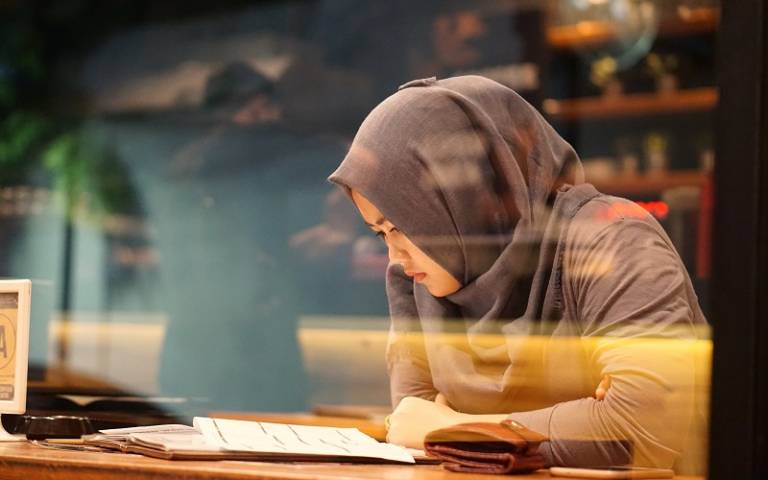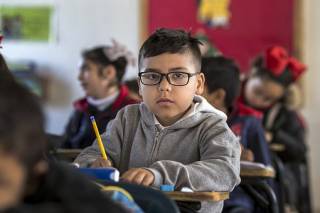How EBPU is addressing McPin Foundation’s 10 Priorities for young people's mental health research
31 January 2019
by Rosa Town

The timely Right People, Right Questions project at the McPin Foundation sought to clarify gaps in the research into child and adolescent mental health.
These gaps, which were identified with the help of children and young people, parents, teachers, researchers and mental health and social work professionals, were condensed into a list of the Top 10 most important questions not conclusively answered by research.
At EBPU, we decided to review our work against these top 10 priorities. Below is a summary of relevant projects and how they link to the 10 questions.
Priority 1: Would the screening of young people be appropriate for the early identification of mental health difficulties, and if so, what would be the best way of carrying this out?
 HeadStart evaluation
HeadStart evaluation

We are leading the evaluation of HeadStart, a five-year £56m National Lottery funded programme set up by The National Lottery Community Fund to improve the mental health and wellbeing of 10–16 year-olds in six areas of England. EBPU is leading a consortium of partners who are collecting and evaluating evidence about what does and does not work locally to benefit young people now and in the future.
Wellbeing Measurement for Schools
In collaboration with the Child Outcomes Research Consortium, we are collecting information from children and young people in schools, colleges and universities about their mental health and wellbeing on an annual basis. Currently, these data are being collected anonymously and fed back to the school, college or university to help them review if they are meeting the mental health needs of their pupils. However, the future plan is to consider if such an approach could be used with appropriate consent to screen for mental health difficulties.
PhD Project: links between emotion regulation and youth mental health issues
Bettina Moltrecht is using the Millennium Cohort Study, a large national dataset, to identify factors that play a significant role in mental health and resilience across childhood development. One of these factors is emotion regulation, and Bettina is developing an app that teaches children different emotion regulation strategies.
Priority 2: How can young people be more involved in making decisions about their mental health treatment?
 On My Mind: a website to support young people with their mental health
On My Mind: a website to support young people with their mental health

Hosted by the Anna Freud National Centre for Children and Families and co-produced with young people, this site includes the Youth Wellbeing Directory of over 1200 support services, a Jargon Buster, videos and a self-care page.
i-THRIVE Grids: decision aids for treatment options
These paper-based decision aids outline available mental health treatment options in NHS and community settings. They aim to facilitate conversations between mental health professionals, young people and families, with the goal of enabling all stakeholders to come to an informed, shared decision about next steps.
PhD project: improving meaningful outcome measurement
Karolin Krause’s PhD topic is ‘What constitutes a good outcome in child and adolescent mental health?’ She aims to stimulate conversations between clinicians and young people about outcomes important to them to be tracked during treatment.
Power Up+ App: supporting shared decision making for young people with SEND
This app seeks to support young people with special educational needs and disability to take an active role in the decisions about their life, to facilitate their independence and to enable their voices to be heard. It has been developed with feedback and input from young people, parents/carers and clinicians, and is currently being tested in a school-based Randomised Control Trial (RCT).
Power Up app: supporting shared decision making
Developed for use within CAMHS, the app empowers young people to take an active role in decision making and promotes agency. It is now being tested by 16-18s in schools and colleges to form ongoing development.
Priority 3: How can Child and Adolescent Mental Health Services (CAMHS), education providers and health and social care departments work together in a more effective manner in order to improve the mental health outcomes of children and young people?
Anna Freud Learning Network: sharing best practice and learning
A free network for any professional working with young people’s mental health. Monthly newsletters contain learning opportunities across the UK.
Child Outcomes Research Consortium (CORC)
CORC supports members to consider the outcomes and experiences of the children, young people and families they are helping.
Priority 4: What are the most effective early interventions or early intervention strategies for supporting children and young people to improve mental resilience?
 PhD Project: considering mental health protective factors
PhD Project: considering mental health protective factors

As part of the evaluation of HeadStart, Mia Eisenstadt is qualitatively exploring young people's perspectives on mental health protective factors in relation to risk factors and wellbeing. She is using this to form a typology of protective factors.
Education for Wellbeing Programme: examining two prevention programmes
Aiming to examine improvements to mental health and help-seeking, this programme is made up of two RCTs called AWARE and INSPIRE. AWARE compares two lesson-based interventions to usual provision in schools. INSPIRE compares three interventions (mindfulness, relaxation and strategies for safety and wellbeing) to usual provision.
PhD project: research into soft toys to support emotion regulation
Early results from Petr’s Slovak’s PhD project support the child-led use of soft toys to support self-care and emotion regulation at home, an intervention that would not rely on parent/teacher training. Children exhibited strong engagement with the pilot version of this intervention.
Wellbeing Measurement for Schools
This is a programme intended to help education providers to understand the needs of their pupils and to monitor the impact of the support they provide. This could help them to consider whether their early intervention strategies are improving the mental resilience of their pupils.
CASCADE Training: supporting better local joint working
The Mental Health Services and Schools Link Programme (CASCADE) supports better joint working between schools and mental health services in local areas. During two-day workshops, attendees share expertise and develop a joint vision for youth mental health and wellbeing. As of 2018, 1,100 schools and colleges and 1,000 mental health professionals had taken part.
Priority 5: What interventions are effective in supporting young people on Child and Adolescent Mental Health Services (CAMHS) waiting lists, to prevent further deterioration of their mental health?
On My Mind: information, advice and guidance on being referred to CAMHS
This site contains information, advice and guidance about being referred to CAMHS and support while waiting. It was created with the Centre’s Young Champions who voiced their concerns about waiting times. These were responded to honestly and openly by the Centre’s clinicians on video.
Referrer Support Project
Funded by UCLPartners, the Referrer Support Project is identifying the best ways to support referrers (i.e. GPs, teachers, social workers) of young people and/or families who are waiting for specialist mental health treatment. Referrers are feeding back about current practice and what would be useful for them. This will culminate in the trialling of a new form of digital support for referrers.
Priority 6: What methods can parents use to identify that a child or young person's mental health is deteriorating?
Education for Wellbeing trial: The Guide
The largest RCT in school-based mental health in England, the trial will involve over 300 schools and 26,000 pupils. One of five approaches being investigated is the Canadian teacher training programme called The Guide. Adapted for England for the study, it develops teachers’ mental health understanding, trains them to teach pupils about it and addresses stigma. It also supports parents to identify mental health problems in their children.
Priority 7: Which interventions are effective at supporting suicidal young people?
Education for Wellbeing trial: YAM
This trial is also investigating Youth Aware Mental Health (YAM), a five-lesson approach for Y9 developed in Sweden and America that uses roleplay to improve mental health literacy and reduce suicide rates. It also encourages pupils to share ideas about maintaining good mental health and resolving everyday dilemmas.
Priority 8: How do family relationships, parental attitudes to mental health, and parenting style affect the treatment outcomes of children and young people with mental health problems (both positively and negatively)?
SafeCORE evaluation: assessing a whole-family approach
This project assesses a compassion/emotion-regulation-based, whole-family approach to address couple violence in families. It uses qualitative and quantitative tools to assess impact on families and outcomes related to wellbeing, which could impact resilience-building in families.
Priority 9: What are the most effective self-help and self-management resources, approaches or techniques available for children and young people with mental health issues?
 On My Mind: self-care section
On My Mind: self-care section

To guide future research, this section of On My Mind seeks to identify which self-care approaches young people are using and finding helpful. It also provides self-care ideas for young people struggling with their mental health. Also live are two online self-care surveys, one for children and young people who have experienced anxiety and depression, and the other for their parents/carers.
HeadStart evaluation: qualitative strand
As part of the five-year evaluation of HeadStart, Emily Stapley and colleagues at EBPU and the University of Manchester are conducting qualitative research into young people's perspectives on approaches to self-care and sources of support accessed when facing difficulties.
Self and community strategies scoping review
Led by Miranda Wolpert, EBPU conducted a scoping review of self or community approaches to managing anxiety and depression in children and young people, as well as a systematic review of the effectiveness of these approaches. While over 100 approaches were identified, few had been formally evaluated. The Lancet Psychiatry published the review in December 2018.
Self-care focus groups
These focus groups aim to find out more about the self-care approaches young people attending youth organisations use and why. We aim to run six sessions involving an interactive activity and discussion by Spring 2019.
Priority 10: What is the most effective way of training teachers and other staff in schools and colleges to detect early signs of mental health difficulties in children and young people?
Wellbeing Measurement Framework (WMF)
The WMF for primary school, secondary school and colleges is a comprehensive and practical package of validated measures to assess whole-school pupil mental health and detect difficulties, which could lead to early access to appropriate support.
Key links
- McPin Foundation Report
- HeadStart
- Millenium Cohort Study
- On My Mind
- i-THRIVE Grids
- PhD Projects
- Power Up
- Anna Freud Learning Network
- Child Outcomes Research Consortium
- HeadStart: Qualitative Evaluation
- Education for Wellbeing Trial
- Wellbeing Measurement Framework
- CASCADE
- Referrer Support Project
- SafeCORE Evaluation
- Self or Community Strategies Review
- Self-care Survey
 Close
Close

